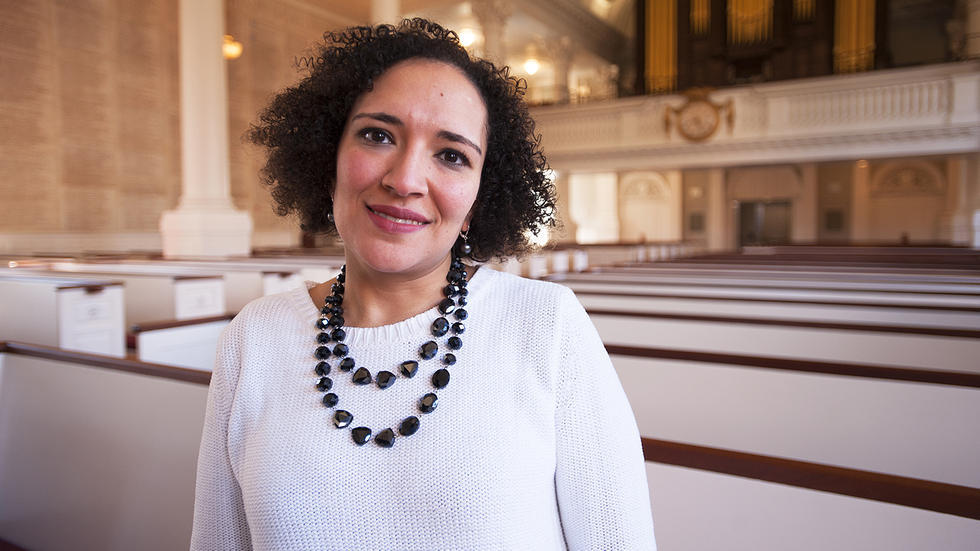 Morning Prayers speech by Soha H. Bayoumi, Allston Burr Assistant Dean of Harvard College, Kirkland House; Lecturer, Department of the History of Science. Photo by Jeffrey Blackwell/Memorial Church Communications
Morning Prayers speech by Soha H. Bayoumi, Allston Burr Assistant Dean of Harvard College, Kirkland House; Lecturer, Department of the History of Science. Photo by Jeffrey Blackwell/Memorial Church Communications
In June 2010, I stood with 300 other people in Lazoghli square, a square adjacent to the Egyptian ministry of interior, notorious, under decades of former dictator Hosni Mubarak’s rule, for torture and police brutality. We stood there in the scorching Cairene sun to show our indignation at the brutal killing, a few days prior, of a 28-year-old Alexandrian man by the name of Khaled Said at the hands of the Egyptian police. It was the last straw in a long history of mortal violence perpetrated by a ruthless police state against its own citizens. Despite the countless protests that the streets of Cairo had witnessed over the previous few years, this was the first protest to dare approach the menacing ministry of interior.
Those of us who came out knew what risks we were facing, many of us were arrested, and the rest of us were kettled by twice as many policemen in uniform cordoning us off in an ever-tightening ring, denying us exit, food and water for six hours in the scorching June heat. Passersby and residents in neighboring buildings threw us bottles of water every now and then, some of those reached us, but the throwers risked arrest as well.
When I stood with dozens of other strangers in Lazoghli square, I didn’t know what to expect. I knew I could have ended up in jail, and I was afraid of that prospect, but I was more afraid of staying silent. I was afraid of jeopardizing my graduate studies which were nearing their end, and my academic career which was about to begin. But I was more afraid of looking at myself in the mirror and knowing that I didn’t speak up when I saw a brutal injustice. And when I saw the strangers throwing us bottles of water, my fear suddenly disappeared and was replaced by unmitigated hope. A hope that allowed me to tap into my deep-rooted belief that unjust situations are fundamentally unsustainable, and that, as in the memorable words of the Rev. Martin Luther King, Jr., “The arc of the moral universe is long, but it bends towards justice.”
In the Lazoghli protest, the orders came six hours later to let us go, with a threatening message: on our way out of the police cordon, we would each stop and have our picture taken by the police.
Over the next few months, many Egyptians, dressed in black, held weekly, silent vigils all over Egypt for Khaled Said and the countless victims of police brutality. And seven months after that June protest, millions of Egyptians took to the streets to topple Hosni Mubarak. Hundreds of protesters were killed and thousands were maimed, but Hosni Mubarak was ousted. The rest is now history
I was afraid again many times, and many times my fear dissipated into hope. My personal hope merged into the collective hope of the Egyptians who dreamed of a better tomorrow, “seeking a now that can breed futures.” That hope was crushed again when all those tremendous sacrifices by thousands of people gave way to fascist, ruthless, militaristic regimes. And just as I grapple with the bleakness of where I came from, I am faced with the bleakness of where I came to: from the rampant racism, islamophobia and the policing of black and brown bodies, to the alarming transphobia and policing of queer bodies, and every other -phobia in-between.
In the face of this bleakness, I constantly find myself going back to the moment that brought me together with 300 others at the height of Egypt’s Police State’s might and in the scorching summer heat. I remember that nothing then invited me to hope, but that I was able to find hope anyway in action, in the actions of people around me and in our coming together. I remember that despair is a luxury that I can’t afford, when I think of my daughter and insist that “her dreams will not reflect the death of mine.” And when I see the energy and inquisitiveness in my students’ eyes, I find myself resisting the lures of indifference and recalling the words of the Argentine songwriter León Gieco “I only ask of God that he won't let me be indifferent to injustice.”
